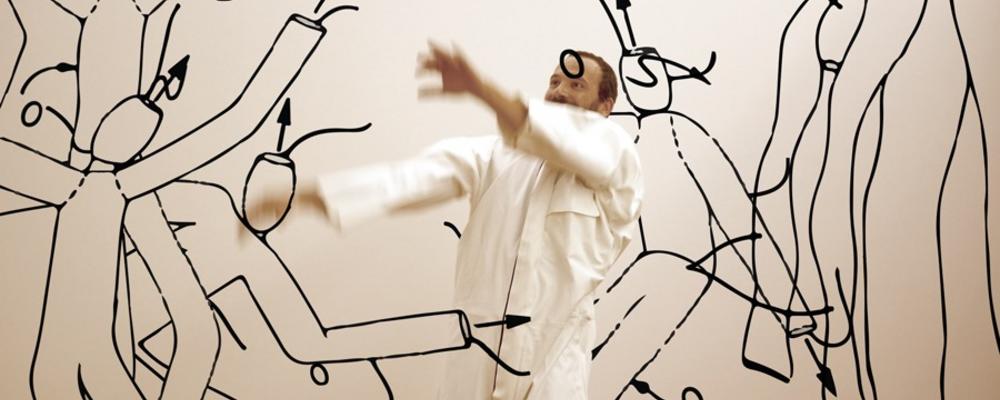
- Hem
- Aktuellt
- Hitta nyheter
- 4 frågor till André Alves inför hans disputation 1 december
4 frågor till André Alves inför hans disputation 1 december
Vi presenterar: André Alves, doktorand i konstnärlig gestaltning, som 1 december försvarar sin avhandling vid en öppen, digital disputation. Vi skickade ett par frågor till André för att höra mer om hans forskningsprocess och vad som har drivit honom i arbetet.
Avhandlingen och disputationen är på engelska, liksom denna artikel.
Hi André Alves!
How would you describe your thesis and your doctoral research?
– Situated within visual art practice, my thesis looks at art as a means to care for the notion of the subject as a nexus of relationality. I ask, what is the role of the production of images in the rejection or compliance in the destruction of human beings by our (accelerated, segregated, competitive, extractive…) present ways of living, which I call “Neoliberal-Teflon imperviousness.” Orienting this thesis project was the belief that the picture is less about demonstration, about fixing an idea, than trigger for a process of listening: looking at what is represented and listening to what is absent or has been made unheard.
How come you decided on this subject?
– At the core of this project is the debate about the effects that capitalism has in the loss of sensitivity and imagination in culture. My project departed from the understanding that sensitivity and imagination are main aspects of what art works with—and what capitalist seeks to appropriate and destroy—and revives old questions of how the aesthetic contributes to how we live, and how to shape artistic strategies of existence.
– Triggering this project was an encounter that I had with an unusual street ad in Porto (Portugal) in 2015, with the text “Sede do Grupo da Juventude Cansada”, which roughly translates as “Thirst/Headquarters of the Group of the Fatigued/Fed-up Youth.” I thought then that such a funny ad could be read as a protest against the prospect of an existence which, in the experience of post-industrial capitalism, accentuates competitiveness and the requisite of being functional, and finds new ways to hijack mental life and what composes a self. The result is a society in which individuals are paradoxically self-exhausted and obsessed with ways to self-preserve themselves. The collateral effect is perceiving others—felt as “delaying” us, “troubling”, “demanding”, “hard work”—as threats. Solution: to cluster ourselves along what is already familiar, predictable, aligned with us. That is a world that does not invite difference and solicits indifference. Can my artistic research contribute to sensitizing and to image alternatives to such static existence? Can it help us imagine differences in order to unlearn and learn anew?
What has been the process? How have you carried out the research?
– The research was developed around twelve projects and forms of writing that articulated, experimented and developed the inquiry. My comfort zone was in the development of the artistic projects, the pleasure and ease of operating in the shifts between verbal and non-verbal.
– Throughout the research, my artistic projects oscillated between the authored and the collective — and embodiment in the artistic practice of the negotiations between the individual and the collective that my inquiry is about. Collaboration is unlikely to be smooth. Working with others is a joy but also straining, energy and emotionally wise. As I write in my thesis, smoothness can be a synonym or signal a desire of imperviousness, of not letting things come through, of remaining unaltered. Collaborative work unsmooths you, messes you up. That calls for vulnerability, and with it, courage. In the development of research, we need to ask if we have the emotional toolkit to be affected by the research or if we will carry the game of dealing with the world and our research subjects at a distance. It’s time for scholar reconsideration of what ‘mess’ and ‘messy’ stands for.
What would you say is your conclusion?
– One of the arguments of my inquiry is how art must take the role to increase affectability in culture, to educate us to welcome the unpredictable, the foreign, difference. In this, I claim that artistic research can rehearse reforms—to reshape in order to change—to Neoliberal-Teflon static, disaffected composition of the world.
My research is described in terms of a practice, and in that sense, never-concluding. At stake is the potential that artistic research might have as a listening ethics and a pedagogy of openness. And this brings up the aspect of responsibility. If changing ideas and sensitivity is perceived by people as threatening, how to emotionally prepare people to welcome change?
– At the later stage of my research, I reflected on the responsibility of scholar work in relation to sensitivity. Sensitivity is not simply insight. Scholar work is typically linked to intellectual and discursive production, not having present the levels of comfort, the “emotional toolkit”, that people need in order to welcome new, challenging, unpleasant, ideas. That art of connecting thinking-feeling is where I see my future work.
Kom på disputationen
Om du är intresserad av att vara med på André Alves online disputation så är du varmt välkommen.
När: 1 december, med start kl 13.00
Var: Zoom-länk för att ansluta (Passcode: 561254)
Avhandlingen finns tillgänglig som fulltext-pdf i GUPEA.